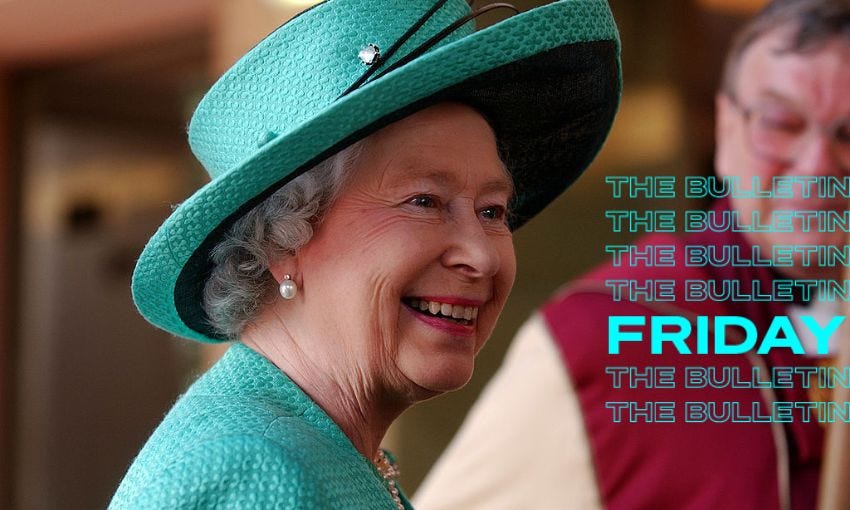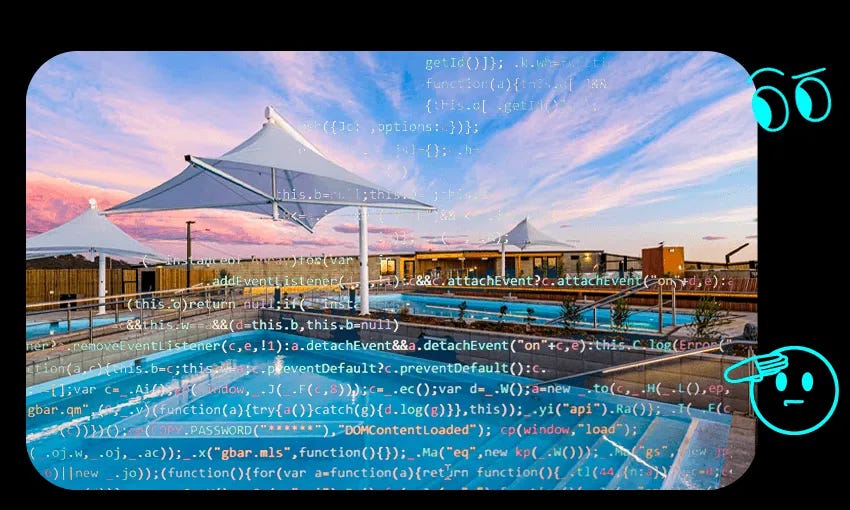Queen Elizabeth II dies at age 96
King Charles III is New Zealand’s new head of state following the death in recent hours of Queen Elizabeth II.
Mōrena and welcome to The Bulletin for Friday, September 9, by Anna Rawhiti-Connell. Presented in partnership with Z Energy.
In today’s edition: the traffic light system may go; NZ cities that will swelter the most in a heat wave; police hedge response to illegal intelligence-gathering report; but first, the longest reigning monarch in British history, Queen Elizabeth II has died at age 96.
Her Majesty Queen Elizabeth II on her last visit to New Zealand in 2002 (Photo by Ross Land/Getty Images)
Queen Elizabeth II, 1926 - 2022
The longest serving British monarch and head of state for New Zealand, Queen Elizabeth II has died. The official notice has been fixed to the railings at Buckingham Palace and flags have been lowered.The initial statement from Buckingham Palace simply read: “The Queen died peacefully at Balmoral this afternoon. The King and The Queen Consort will remain at Balmoral this evening and will return to London tomorrow.” The news is leading all major media outlets across the Western world and in New Zealand this morning. This was the official announcement from the BBC which was followed by “God Save the Queen”. Prince Charles is now King, with confirmation that he will be King Charles III arriving this morning. The new King has issued a statement, describing the death of his mother as “the greatest sadness”.
‘London Bridge is down’
The plan for what happens now is known as “London Bridge”. It is very eerie re-reading this this morning, but the Guardian published the full details of this plan in 2017. “The Queen’s family and her majesty’s doctors will be in attendance.” “Civil servants will say “London Bridge is down” on secure lines”. It has been planned for many years, every detail accounted for and playing out now, in real time. Tributes, obituaries and have been prepared. The BBC and the Guardian both have detailed histories and recountings of her long and extraordinary life. The Herald, RNZ, TVNZ, Newshub and Stuff are all running special live coverage.
Statement from Buckingham Palace about Queen’s health signalled it was serious
The BBC interrupted its normal broadcast just after 12.30pm (BST) following a statement from Buckingham Palace saying the Queen was under medical supervision. The Palace is not prone to sharing details about the Queen’s health and the statement was read as a sign things were serious. Presenter Huw Edwards was dressed in a dark suit and black tie, in keeping with the broadcaster’s on-air dress code when a member of the royal family dies. The Queen’s family all travelled to Balmoral and were there when she died. The Guardian has an outline of what we can expect in Britain over the next ten days.
Prime minister Jacinda Ardern expresses deep sadness
Jacinda Ardern's statement expressed New Zealanders’ deep sadness at the passing of Queen Elizabeth II. The prime minister will speak from the Beehive this morning at 7.30am. Ardern described Her Majesty as a monarch with an unwavering sense of duty. The Queen visited New Zealand 10 times during her reign, her most recent visit in 2002. On her 21st birthday in 1947, the Queen, Princess Elizabeth at the time, made a radio broadcast where she outlined what will no doubt be heralded as the defining characteristic of her reign – a life of service. "My whole life, whether it be long or short, shall be devoted to your service and the service of our great imperial family to which we all belong".
In times of change, we must learn to be resilient
As the world emerges from a period of significant tumult, now is the perfect time to reflect on how we and the organisations we work for have reacted to this disruption. Through The Mind Lab’s new programme, the Master of Change and Organisational Resilience, you’ll learn to build future-focused frameworks for responding to change in and around your organisation. Learn more about this exciting new course now on The Spinoff and take the first step to become a master of your future (sponsored).
Just a note to say that given the news and its likely evolution over the next wee while, I have kept the Bulletin short this morning but I’ve included a few other items for you and a round up of things on The Spinoff.
The end of the traffic light system?
Introduced on December 3, 2021, the traffic light system may have run its course. Cabinet will meet on Monday to decide on the next phase of our Covid response. As the Herald reported yesterday, that could well mean throwing the whole tricoloured system out. There were reports last week that the government was consulting on removing mask mandates from all but high-risk health settings. The main legal instrument which allows the government and officials to exercise special powers during our Covid response, the Epidemic Preparedness (Covid-19) Notice 2020, will expire next Wednesday if cabinet decides not to renew it. Stuff’s Luke Malpass reports that the traffic light system will likely be replaced with some limited rules around testing, isolating and the ability to turn mask rules requirements on and off.
Police respond to investigation into illegal photography prompted by RNZ reporting
In December last year, Te Aniwa Hurihanganui and Hamish Cardwell reported on police admitting to illegally taking photos of youths on the streets of Wairarapa. That prompted an investigation by the Independent Police Conduct Authority and the Privacy Commission. The findings were released yesterday and revealed that police are routinely and illegally photographing and filming young people and adults. It also highlighted systemic problems with how police were capturing, storing and using private biometric information about people. Police Commissioner Andrew Coster said while police acknowledged the wider findings from the inquiry, they presented a challenge to police carrying out their duties.
This month we’re celebrating eight years of The Spinoff. We’ve come a long way since 2014 and that is in no small part thanks to our members – we literally wouldn’t be here today without them. Their generous support underpins all our work and has meant we are able to cover more areas of life in Aotearoa, to tackle more stories about our people and issues impacting our communities. From our ongoing coverage of inequality and the cost-of-living crisis, to political reporting and our focus on te ao Māori, it’s important mahi and we can’t do it without you. Let’s keep a good thing going - tautoko mai, donate today.
The cities that will swelter as temperatures climb
As Stuff’s Eloise Gibson reports, a new study into the likely impacts of heat waves on New Zealand cities has found some of our largest centres will suffer the most severe risks. As an Aucklander I assumed the city would not fare well based purely on our northern location but the research highlights the duration of heat waves and consistency of temperature as the main risk factors. Christchurch, for example, gets spikes of extreme heat but it often doesn’t last as long. The University of Auckland’s Alistair Woodward explains it well, saying: “If summertime temperatures increase across the board by 3C there will be a 60-fold increase in the proportion of days over 30C in Auckland, compared with a 14-fold increase in Christchurch.”
Got some feedback about The Bulletin, or anything in the news? Get in touch with me at thebulletin@thespinoff.co.nz.
Organisations often cry “hacking” when they make mistakes that see their information shared more widely than they intended. Dylan Reeve explains that the Christchurch hot pools story this week is one of those cases. Stewart Sowman-Lund hears the Rotorua mayoral candidates stake their claim for the job at a debate held in the shadow of Sunday's emergency housing documentary. Toby Manhire watches as the High Court donations trial concluded with Jami-Lee Ross’s ‘kamikaze’ defence. Chris Schulz attends a Dragons'-Den-meets-black-tie gala dinner event where startups have five minutes to court the interest of New Zealand's wealthiest investors. Nadine Anne Hura meets the students and teachers of Taitā College reclaiming the forest and wetlands. Sam Brooks presents a unified theory of wigs on TV.











